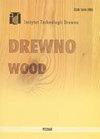The influence of surface modification of wood particles with carbon nanotubes on properties of particleboard glued with phenol-formaldehyde resin.
IF 0.9
4区 农林科学
Q3 MATERIALS SCIENCE, PAPER & WOOD
引用次数: 6
Abstract
Research was carried out on a newly manufactured particleboard (PB) containing carbon nanotubes (CNTs) to determine the effect of the CNTs on physical, mechanical and combustion properties of the board. The experiment consisted of two stages. In the first, wood particles were treated with an aqueous suspension of CNTs (0.2% w/w) and sodium dodecylbenzenesulfonate (0.2% w/w) as a dispersant. After drying to constant weight, a modified form of the ASTM E69 method was used to determine the effectiveness of fire protection provided by CNT-modified wood chips. The rate of wood decomposition decreased significantly, and the time to complete combustion increased from 18 to 22.5 min for the reference and CNT-modified wood particles respectively. In the second stage of the experiment a particleboard bonded with phenyl-formaldehyde resin was produced, in which the particles were modified with CNTs using the method described in the first stage. Selected physical and mechanical properties of the final board were determined. Samples of the board were tested using a mass loss calorimeter in accordance with the ISO 13927 standard, and mechanical tests were performed by applicable standard methods. However, no significant improvement in the properties of the PB were observed.碳纳米管对木材表面改性对酚醛树脂胶合刨花板性能的影响。
对一种新型含碳纳米管刨花板(PB)进行了研究,以确定碳纳米管对刨花板物理、机械和燃烧性能的影响。实验包括两个阶段。首先,用碳纳米管(0.2% w/w)水悬浮液和十二烷基苯磺酸钠(0.2% w/w)作为分散剂处理木材颗粒。干燥至恒重后,采用ASTM E69方法的改进形式来确定碳纳米管改性木片提供的防火效果。碳纳米管改性木材颗粒的分解速率显著降低,完全燃烧时间分别从18 min增加到22.5 min。在实验的第二阶段,制作了与苯甲醛树脂粘合的刨花板,其中使用第一阶段描述的方法用CNTs对颗粒进行改性。确定了最终板的选定物理和机械性能。根据ISO 13927标准使用质量损失量热计对电路板样品进行了测试,并采用适用的标准方法进行了机械测试。然而,没有观察到PB性能的显著改善。
本文章由计算机程序翻译,如有差异,请以英文原文为准。
求助全文
约1分钟内获得全文
求助全文
来源期刊

Drewno
MATERIALS SCIENCE, PAPER & WOOD-
CiteScore
1.10
自引率
12.50%
发文量
0
审稿时长
>12 weeks
期刊介绍:
Wood. Research papers. Reports. Announcements" ("Drewno") is an international scientific journal that publishes original results of innovatory basic and applied research concerning technological, technical, economic and ecological issues important for the wood science and forest-based industries, including their environment, and interesting to the international recipients. "Drewno" is an Open Access biannual journal.
Aims and scope:
wood science: anatomy, biology, chemistry, physics
wood mechanical and chemical technology, inter alia, sawmilling, composite wood products, wooden construction, furniture making, wood pulp, paper making
material engineering, biocomposites, nanocomposites
material management
environmental protection, safety of the processes, products and working stations
biotechnology
bioenergy, biofuels
forestry: harvesting and wood quality
wood-based industries economics
The Editorial Board of the journal especially welcomes articles concerning increase in wood resources (wood mobilisation); innovative composites and lignocellulosic materials; new trends in the protection, modification and finishing of wood; biorefining of raw wood material; "green" building; new technologies of wood waste recycling; sustainable development; innovation management; and business networks.
 求助内容:
求助内容: 应助结果提醒方式:
应助结果提醒方式:


